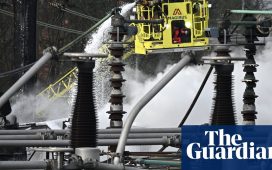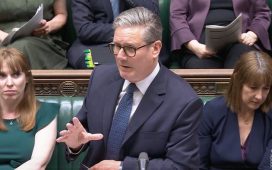Stay informed with free updates
Simply sign up to the UK energy myFT Digest — delivered directly to your inbox.
The UK’s largest electricity producer has warned that the government is in danger of failing to secure enough new offshore wind projects this year due to flawed internal modelling around the technology.
RWE told the Financial Times that ministers risk overestimating the costs of offshore power to bill payers leading it to potentially award fewer of the government support contracts needed to get projects off the ground.
The German company, which produces about 15 per cent of the UK’s electricity and is developing offshore wind projects in the UK, wants officials to rethink their approach ahead of the next auction round in the summer.
“We have given this message to say — you are in danger of not deploying as much renewables as is economically possible,” said Tom Glover, UK country chair for RWE, which is listed in Frankfurt with a market capitalisation of about €23bn.
“We need to keep on track for the overall mission, which is renewable deployment.”
Offshore wind is set to play a crucial part in the UK’s efforts to cut its carbon dioxide emissions to net zero by 2050. The government wants to have 50 gigawatts installed by 2030, up from roughly 14GW today.
The upcoming auction round for government contracts this year is vital for the industry’s prospects after the 2023 round flopped. No offshore wind developers bid after repeatedly warning the level of government support on offer was too low to offset rising costs.
In response, the government has raised the maximum price that new wind farms could be paid for each megawatt-hour they eventually produce under its subsidy scheme.
The scheme is designed so that consumers fund top-ups to developers if the wholesale price of power falls below a certain level.
However, ministers have not yet released forecasts for wholesale power prices and wind farms’ performance, which will help determine the cost to bill-payers and, therefore, the number of wind farms it can back in its budget.
RWE warned that the forecasts used in the previous auction round for these subsidy contracts did not match market assumptions, with wholesale prices too low and performance too high, and that this could be damaging if repeated.
Adam Berman, deputy director at trade group Energy UK, echoed the concerns. “It’s become clear over the last couple of years that there have been some fundamental methodological issues with the [contracts] design.
“The reality is we don’t have many auction rounds left to play around with. It’s incumbent on the government to recognise that we are behind where we should be and we have some catching to do.”
Alex Asher, senior consultant at Cornwall Insight, agreed the government’s expectations on power prices looked “on the low side”.
“There’s benefits to all parties in trying to get those prices as accurate as possible,” he added.
RWE is developing 10 offshore wind projects in Britain with a total capacity of 11.2GW, including the Sofia project it is building 195km off England’s north-east coast.
In December it agreed to buy three big projects in development from Swedish rival Vattenfall, months after the latter suspended work on the most advanced of them, Norfolk Boreas, blaming rising costs.
A government spokesperson said it reviewed its assumptions on potential project costs ahead of every auction, and highlighted the success of the scheme so far in driving “substantial” growth across the renewables sector, with the world’s five largest offshore wind farms located in the UK.










